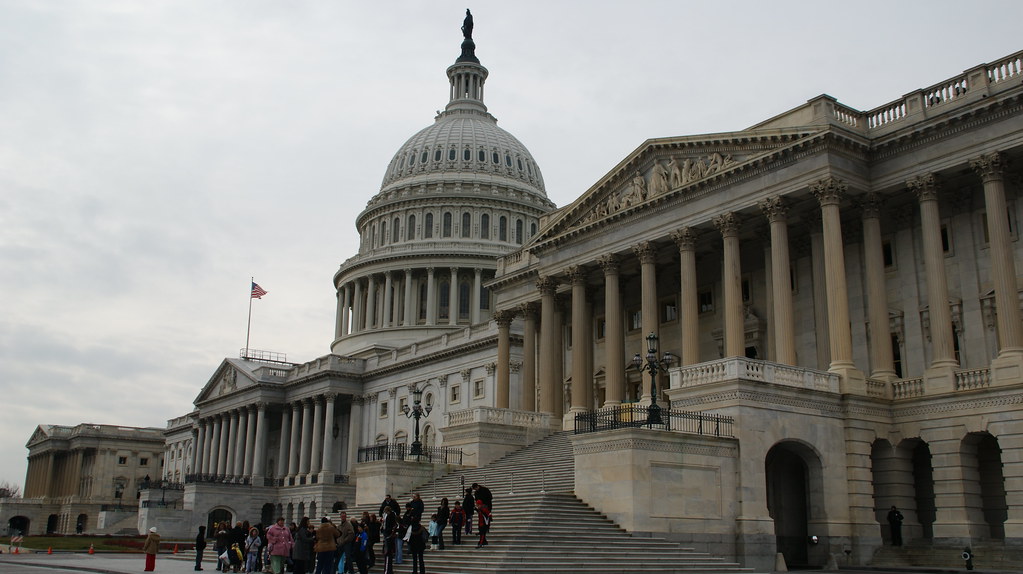Why Is Congress Conducting Business as Usual in the Face of Coronavirus?
There is no good reason why the Capitol is still open to the public and members are being allowed to give tours to children.

Published by The Lawfare Institute
in Cooperation With

It’s not a picture of a leader modeling good behavior in addressing COVID-19, the disease caused by the new coronavirus: There’s the macho, business-as-usual attitude. There’s the refusal to reduce public access to facilities and officials. There’s the show, for apparent political effect, of not being cowed by a mere microbe from doing the job the people elected you to do.
No, we’re not talking about Donald Trump. We’re talking about Nancy Pelosi.
Congress has work to do in the face of the virus—real work. Last week it appropriated $8.3 billion for emergency spending on research and public health measures. Now it has to consider what to do in response to possible economic fallout from the virus, everything from aid for hard-hit workers to a possible stimulus package. By its nature, moreover, Congress is a distributed body, requiring large numbers of people to convene in the same rooms in order to do much of anything. So the problem of how the institution should be organized in a time of rapidly spreading communicable disease is a hard one.
But here’s what Congress shouldn’t be doing: business as usual. In a normal situation, Congress is a Petri dish. There is large-scale public access to the Capitol complex. There are large numbers of tourists interacting with members and staff. There is a great deal of needless in-person human interaction that creates, in turn, needless vectors of possible transmission of disease. In the face of the current pandemic, the speaker of the House should be modeling organizational management designed to continue operations while minimizing physical presence and in-person interactions. She should be offering other organizations a highly visible example, which will legitimize early decisions by groups both private and public to think creatively in combating the virus.
At least so far, she’s not doing that.
On the night of Monday, March 10, reporters asked if Pelosi thought the Capitol should be closed: “No, no, no,” was her response. In a letter to colleagues that same day, she said that she and other House Democrats would hear the next morning from the sergeant-at-arms, Congress’s attending physician and the chief administrative officer for “an update on the continuity of operations protocols for the Capitol and to prepare our offices” and that these officials are “constantly monitoring developments.” She continued, “At the present time, there is no reason for us not to continue with our vital legislative work in the Capitol. Tomorrow morning, we will have an opportunity to hear from these officials together and discuss in greater detail.”
Asked about the possibility of leaving Washington or remote voting, Pelosi reportedly dismissed the idea: “We are the captains of the ship. We are the last to leave.”
Congress is already expected to be out of town next week, as well as two weeks in April. Asked on March 10 whether that schedule might change to address a new package of legislation to address the spread of COVID-19, Pelosi seemed to imply that the House would follow the regular recess schedule but would reconvene if needed and if there is a clear pathway in the Senate for additional legislation.
House Majority Leader Steny H. Hoyer said that congressional leadership has been in discussions with the Capitol physician and other health experts. “At this point in time ... we don’t have any advice that tells us that we ought to shut down, not have sessions, not have the Capitol open .... But we are very, very concerned.” Hoyer commented that members of Congress cannot legislate from their homes to address the crisis, “so to the extent that we can be here, we think that’s good policy.”
We can’t fault House leaders for following expert advice on the matter. The Office of Attending Physician, which was created in 1928 after a congressman dropped dead and two others collapsed apparently as a result of excessive work, has been advising Pelosi and others on Capitol Hill. According to the Washington Post, in a statement Monday, that office indicated it had advised members and supported decisions by members in connection with the infected person who attended the Conservative Political Action Conference (CPAC). Several Republican members of Congress, including Sen. Ted Cruz, Rep. Doug Collins and Rep. Matt Gaetz are self-quarantining after having contact with the infected person. “The Office of Attending Physician supported this overall prudent individual choice by the members due to the unique requirements of members of Congress and their travel, professional work, and frequent interaction with members of the public,” the statement said.
The trouble is that not everyone is behaving so prudently. Rep. Louie Gohmert—who also had contact with the coronavirus patient at CPAC but declined to self-quarantine—is instead, apparently on the advice of a physician, choosing to observe “proper hygiene protocols.” He led a large group of children around on a tour of the Capitol yesterday. What’s more, whatever the advice of the attending physician may be, the House’s approach is objectively less aggressive than that of—for example—major universities and organizations around the country that have canceled conferences and other large gatherings.
Over on the Senate side, meanwhile, the attitude seem likewise fairly blase: Senate Majority Whip John Thune told reporters after a closed-door Republican leadership meeting on Monday night, “I think at this point it’s business as usual, but obviously everybody is paying attention to the developments as they happen.” When asked about security in the Capitol, Sen. John Cornyn told reporters, “You’re very safe.... Just do what your mother told you to do, wash your hands.” Sen. Roy Blunt, the chairman of the Senate Rules Committee, said he thought the Senate would keep to its regular schedule.
Lawmakers are right to be concerned that taking sudden, drastic action within the Capitol could cause panic among everyday Americans. They are also correct that the business of Congress needs to continue. They are dead wrong, however, that the Capitol needs to be open as usual to outsiders. It is dramatically irresponsible to allow members to be giving tours of the building to gaggles of people who will then fan out across the country. And it is also irresponsible to conduct hearings that don’t need to happen while an often-lethal virus is spreading uncontrolled around the world.
More generally, the congressional leadership is wrong that the institution’s working presumption should be that staff and members should be congregating there for routine matters that don’t actually require physical presence. The presumption should be the opposite, as it should be for all organizations: The goal is to maximize social distancing in a fashion consistent with performing necessary operations. Staff who can work from home should do so. Members should be present only for votes and wholly necessary hearings.
Even recently, this would have been impossible. But modern telecommunications are a marvelous thing.
In that vein, it seems past time for Capitol Hill to give serious considerations to reasonable proposals to allow certain types of legislative work to be done remotely. For example, Reps. Eric Swalwell and Rick Crawford on Monday introduced a bipartisan House resolution that would change House rules to allow lawmakers to attend hearings by means of teleconference and cast certain types of uncontroversial votes remotely. Swalwell first introduced the resolution in 2013, but it has never gained traction. In fact, in 2014, Pelosi dismissed it and a similar idea—proxy voting—as a “slippery slope.” She may or may not be right that in the “regular order” such ideas are not a good idea. But situations of fast-spreading communicable disease may require something different than the regular order; it may be time to give such ideas a second, deeper look. It’s certainly time to stop striking stalwartly fearless leadership poses. Leadership in this situation involves getting used to conference calls and teleconferences—and being seen to do so, to enable others to follow suit.






